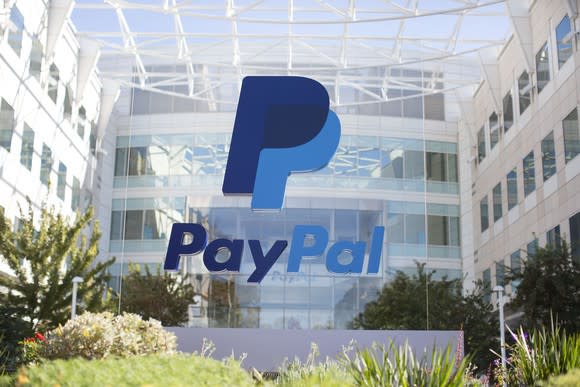PayPal Stock Upgraded: What You Need to Know
Every day, Wall Street analysts upgrade some stocks, downgrade others, and "initiate coverage" on a few more. But do these analysts even know what they're talking about? Today, we're taking one high-profile Wall Street pick and putting it under the microscope...
Three months ago, I urged investors to avoid PayPal Holdings (NASDAQ: PYPL) -- despite the stock winning multiple upgrades on Wall Street -- because it was too expensive. So what's happened since then?
PayPal has gone nowhere but up, gaining 14% in the three months since I panned it. And this morning, PayPal looks like it could rise even further after winning another buy rating on Wall Street, this time from German banker Berenberg.
I still say they're wrong.

Image source: PayPal.
Upgrading PayPal stock
Berenberg is singing PayPal's praises this morning in a note covered on StreetInsider.com. "We believe PayPal is a core holding in the payment and fintech space because it is well positioned to enable financial inclusion via its wide product range, which includes digital wallets, money transfer, P2P payments, credit and card issuance," argues Berenberg.
The analyst further likes PayPal for its "two-sided platform, which serves merchants and consumers." Although rival Square, too, has made moves toward building a consumer-facing business with its Square Cash app, this initiative isn't as far advanced as is PayPal's. In fact, PayPal's got a big enough lead in consumer financing and peer-to-peer payments as to make its business model "unique, in our view," says Berenberg.
Servicing both merchants and consumers gives PayPal a "large user and merchant base," creating "a scale advantage," argues the analyst. As a result, PayPal is now "the world's most popular alternative payment option, which leads to further user/merchant adoption" -- a virtuous cycle and a moat to defend the company against rivals.
How's that working out for PayPal?
Judging from the numbers, Berenberg is right about that. In PayPal's Q2 earnings report, the company reported a 23% year-over-year jump in revenue and 28% growth in earnings per share.
Active PayPal accounts grew 18%, the amount of payments sent by all those users increased 29%, and the amount of peer-to-peer payments sent via Venmo exploded 78% higher. Not only are there more customers using the service now that a year ago, commented my fellow Fool.com contributor Matthew Frankel at the time, but "PayPal customers are using the company's platform more often."
How's that working out for PayPal shareholders?
All of this was pretty impressive news. And yet, there was a downside. Because expectations for PayPal are so high (analysts polled by S&P Global Market Intelligence expect it to post 20% average annual earnings growth over the next five years), any glitches in the growth story can have an outsize effect on investors' reactions to the news. In the case of Q2, the simple fact that PayPal predicted it would book no more than $3.67 billion in revenue in Q3 -- when Wall Street had been telling investors to expect $3.71 billion -- caused a 5% sell-off in the stock on earnings day.
And it's taken more than a month for PayPal to recover those losses.
What it means to investors
Priced close to $93 a share today, PayPal is once again trading back above where it was prior to reporting Q2 earnings a month ago. And yet, I'd argue that the risk to the stock remains the same as it was then.
At a share price nearly 55 times trailing earnings, PayPal simply costs too much for the 20% growth rate that it has promised to deliver to investors. In fact, judging from how investors reacted to Q2's news in July, I'd say the stock is priced too high even for the 28% earnings growth that PayPal delivered back then.
Could I be wrong? Of course I could. In fact, I was wrong in predicting PayPal's price would be dragged back down to more realistic levels back in May. But while it's entirely possible that the stock will continue to defy gravity, the higher it goes, the greater the risk that PayPal will fall back down to earth. Priced for perfection today, I can't recommend that investors take that risk -- and Berenberg is wrong to recommend it.
More From The Motley Fool
Rich Smith owns shares of Square. The Motley Fool owns shares of and recommends PayPal Holdings and Square. The Motley Fool has the following options: short September 2018 $80 calls on Square. The Motley Fool has a disclosure policy.
